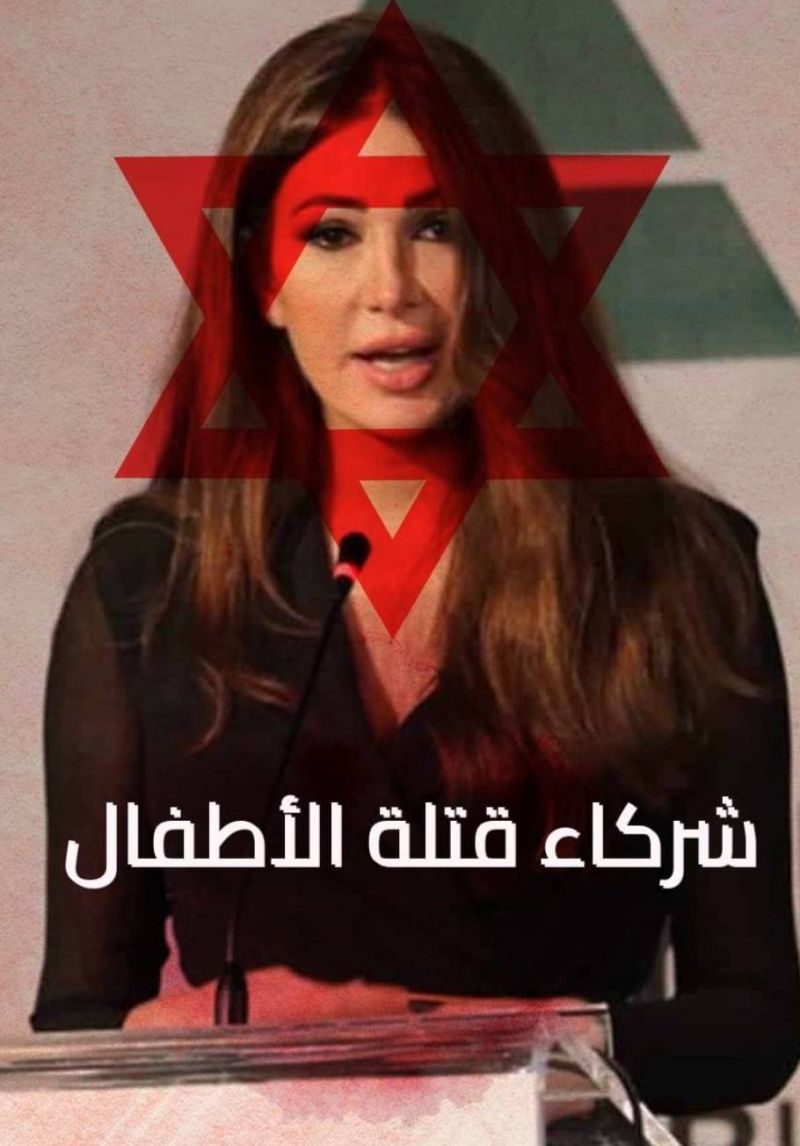
One of the photomontages circulating online accusing Dima Sadek of being “complicit in the massacre of children.” (Credit: Jamal Cheaïb via X)
Disturbing photomontages of various Lebanese media personalities with blood-stained Stars of David interposed on their foreheads along with the slogan “aiding and abetting the massacre of children” have been circulating on X of late.
The unsettling images emerged shortly after three young girls and their grandmother were killed by an Israeli airstrike. Remas, Taleen, Layan Chour, and their grandmother Samira Hussein Ayoub lost their lives when their car was targeted by a drone on Nov. 5 near the town of Ghedmata in southern Lebanon.
Journalists including Dima Sadek (MTV), Rami Naim (elsiyasa.com), Tony Boulos (Jusur), Nadim Koteich (Sky News) and Layal Alekhtiar (al-Arabiya), along with Lebanese Forces spokesman Charles Jabbour, found themselves targeted in a defamatory online campaign orchestrated by pro-Hezbollah accounts, which included hate messages and even death threats.
Despite their common critical stance toward Hezbollah, these personalities oftentimes hold profound differences in opinion about the ongoing conflict Hamas-Israel war, which involves Hezbollah’s armed wing at the southern border.
“There’s a real difference between Dima Sadek’s anti-Israeli stance and that of Nadim Koteich, who supports the Abraham Accords,” explained Mohanad Hage Ali, a researcher at the Carnegie Endowment. “But the aim of this campaign is to put everyone in the same basket, to create a binary political scene where being against Hezbollah means being a traitor [to the homeland].”
“Jounalists, like Sadek, who are at the same time against the political establishment and pro-Palestinian, and critical of Hezbollah, have been particularly targeted,” Hage Ali said.
Hezbollah’s electronic army
For Sadek, this new online campaign, the latest in a long series of attacks against the journalist, has been particularly difficult to endure.
“I come from a left-wing, pro-Palestinian background and for a month now I’ve been denouncing Israeli crimes committed in Gaza with American support,” Sadek said. “Yet at the same time, I’m regularly accused of being a ‘collaborator.’”
“Until now, I didn’t care, because for me, the Palestinian cause and the denunciation of the ongoing crime against humanity in Gaza take precedence,” she added.
القتلة .. شركاء القتلة المجرمين.#المدني_بالمستوطن pic.twitter.com/eovMUZJbYc
— jamal cheaib (@JamalCheaib) November 5, 2023
“Seeing children massacred in my area and being accused of complicity was too much,” said Sadek, who is originally from the South.
“The agents are those who sold our gas to Israel,” Sadek said via X on Nov. 6, in reference to the Oct. 27, 2022, maritime agreement between Israel and Lebanon.
Sadek is not surprised to be placed alongside personalities with political views sometimes diametrically opposite to her own. “They [i.e., Hezbollah’s online supporters] have no concept of nuance and are unable to differentiate between criticism and being a traitor.”
Jad Chahrour, head of communications at the Samir Kassir Foundation’s SKeyes Center, believes without a doubt this campaign is being waged by “Hezbollah’s electronic army,” which is engaged in “a series of ‘digital assassinations.”
“The objective is not only to intimidate the targeted individuals but also to instill fear among the party’s supporters, suggesting that aligning with the opposing camp would subject them to similar threats,” Chahrour explained.
In October 2021, Chahrour spoke to L’Orient-Le Jour about an online smear campaign targeting Judge Tarek Bitar, who was in charge of the investigation into the 2020 Beirut port explosion.
“This army comprised fake Twitter accounts, trolls, ordinary supporters, and influential public figures who align themselves with cases Hezbollah wishes to undermine, such as the investigation into the Aug. 4, 2020, port explosion,” Chahrour explained.
A foretaste of the future
In the current case, the targeted personalities are accused of “treachery” in the pay of Israel, “which is considered a crime under Lebanese law and should therefore not be taken lightly,” warned Chahrour.
“After the death of the three girls [in the south], I said via X that Hezbollah had their blood on its hands because, by taking part in the war in Gaza, it was offering Israel justification for committing its crimes in Lebanon,” Naim said, recounting how he became a target of the ongoing campaign.
“A few minutes later, my photo with the Star of David appeared online, followed by numerous messages such as, ‘Your blood will be spilled because you are an Israeli agent,’” he said.
Naim, a journalist and fervent critic of Hezbollah, defended his right to express opposition to the party “without having to face death threats.”
“However, for Hezbollah’s supporters, anyone who criticizes the party today is a criminal who must be eliminated,” Naim added.
Why are Hezbollah’s supporters reacting with such passion?
According to Sadek, the party found itself “stuck” since Hezbollah leader Hassan Nasrallah made a television appearance.
“They know that his speech was disappointing for the party’s rank and file and contradictory to what they have been defending for 20 years,” Sadek said. “So, they need a scapegoat to deflect attention from the growing sense of malaise within the party.”
Hage Ali believes “this could also be a foretaste of the political scene that could emerge after the conflict.”
“Hezbollah is trying to establish what will and won’t be acceptable in political discourse when the war is over, by tightening the space for freedoms right now,” he said. “It’s a kind of teaser of what could come: a political landscape where any NGO supported by the West or any voice critical of Hezbollah will not be tolerated.”
This article was originally published in French in L'Orient-Le Jour. Translation by Sahar Ghoussoub.